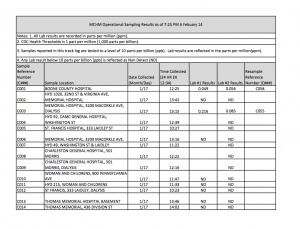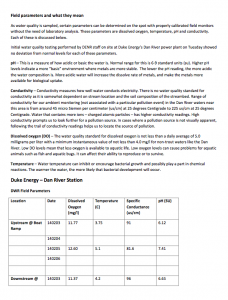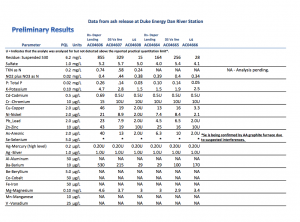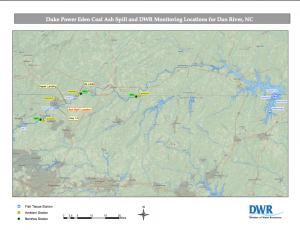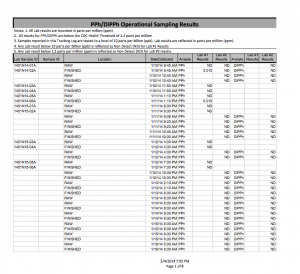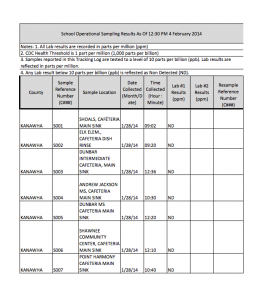Water sample information provided by the West Virginia Division of Homeland Security and Emergency Management. This sampling was conducted between 1-17-14 and 2-5-14. The department has not published any information about who did these tests. These results are all for 4-methylcyclohexane methanol.
Monthly Archives: February 2014
MCHM at George Washington High School
On February 7, the Charleston Gazette reported that MCHM was found at Charleston’s George Washington High School. The lab results received around 8 am show that MCHM was detected in water at levels of 18.33 parts per billion (ppb), which is higher than the deemed safe 10 ppb.
NC DENR Dan River Water Quality: pH, Conductivity, Dissolved Oxygen, and Temperature
The North Carolina Department of Environment and Natural Resources conducted tests in the Dan River for pH, Specific Conductance, Temperature, and Dissolved Oxygen. They say, “Initial water quality testing performed by DENR staff on site at Duke Energy’s Dan River power plant on Tuesday showed no deviation from normal levels of temperature, pH, dissolved oxygen and conductivity due to the release of water and ash from the facility’s coal ash impoundment…These initial results do NOT mean the water is safe. DENR staff are continuing to sample and test the water. On Tuesday, the first round of water samples were delivered to a lab in Raleigh for further testing for heavy metals, sulfates, nutrients (nitrogen and phosphorus), and total suspended solids.”
NC DENR Dan River Preliminary Water Quality Test Results
The North Carolina Department of Environment and Natural Resources published test results from water quality testing on the Dan River. The following is an explanation about the tests they conducted:
“State test results completed Thursday for a number of water quality parameters, including 17 metals, show no violations of state water quality standards for most samples taken Monday and Tuesday near the site of the coal ash spill in Eden. Test results for the remaining parameters will be released as soon as they are available.
One metal, copper, was above the state action level surface water standard both Monday and Tuesday. Because copper is a naturally occurring element in North Carolina waters, action level exceedances are used to trigger further investigation. While levels of copper decreased significantly on Tuesday, DENR will continue to monitor copper and the other elements.
North Carolina has established its federally approved water quality standards based on scientific data designed to protect human health and the aquatic environment.
DENR is still waiting on metals analysis to be completed for boron, titanium, vanadium, iron, cobalt, beryllium, aluminum, selenium, lithium, manganese and strontium. A monitoring plan to characterize coal ash in the river bed and along the river banks is in development and will be implemented in the coming days.”
NC DENR Dan River Water Quality Testing Sites
The North Carolina Department of Environment and Natural Resources has released a map for water quality testing sites on the Dan River. They say, “The map shows three sampling locations: Draper Landing, just downstream of the spill site; downstream of the spill site at the Virginia line; and upstream at a location on Hwy 14. All of the sampling sites are at bridge crossings. The map also shows locations where DENR conducts regular testing.”
Two Schools Closed Yesterday
According to the Wall Street Journal: “Two West Virginia schools dismissed students early Wednesday after a teacher and a student became ill from vapors believed to be related to last month’s chemical spill.
The sicknesses were in Belle, about 10 miles from Charleston, where about 10,000 gallons of Crude MCHM, a chemical used in coal processing, leaked into the Elk River on Jan. 9. The spill contaminated the drinking water for 300,000 residents in and around the state capital, including in Belle, for at least five days.”
Appalachian Voices Observations
Staff were on site at the spill from Monday evening through Wednesday evening. As of Wednesday evening, the coal ash pond was still discharging into the Dan River.
We have collected samples and will post results for heavy metals and other parameters as soon as they become available.
Initial Testing from NC DENR
The Department of Environment and Natural Resources (DENR) reports: “Initial water quality testing performed by DENR staff on site at Duke Energy’s Dan River power plant on Tuesday showed no deviation from normal levels of temperature, pH, dissolved oxygen and conductivity due to the release of water and ash from the facility’s coal ash impoundment. These initial results do NOT mean the water is safe. . . On Tuesday, the first round of water samples were delivered to a lab in Raleigh for further testing for heavy metals, sulfates, nutrients (nitrogen and phosphorus), and total suspended solids.”
DNER is testing for:
Potassium
Cadmium
Chromium
Copper
Nickel
Lead
Zinc
Vanadium
Silver
Aluminum
Beryllium
Calcium
Cobalt
Iron
Molybdenum
Antimony
Tin
Thallium
Titanium
Lithium
Magnesium
Manganese
Sodium
Arsenic
Selenium
Mercury
Barium
Boron
Check back here for results, when they become available. We will also post them to this site.
Water Sample PPH Results as of February 4
Water sample information provided by the West Virginia Division of Homeland Security and Emergency Management. This sampling was conducted between 1-10-14 and 2-3-14. The department has not published any information about who did these tests. These results are for chemical PPH.
WV MCHM School Water Sample data February 4
School water sample information provided by the West Virginia Division of Homeland Security and Emergency Management. This sampling was conducted between 1-28-14 and 2-3-14. The department has not published any information about who did these tests. These results are all for 4-methylcyclohexane methanol.

